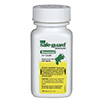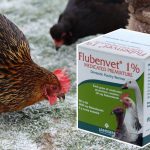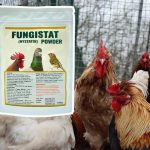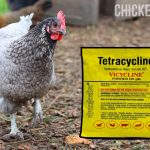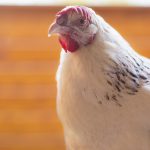Fenbendazole For Chickens: Uses, Dosage, Side Effects
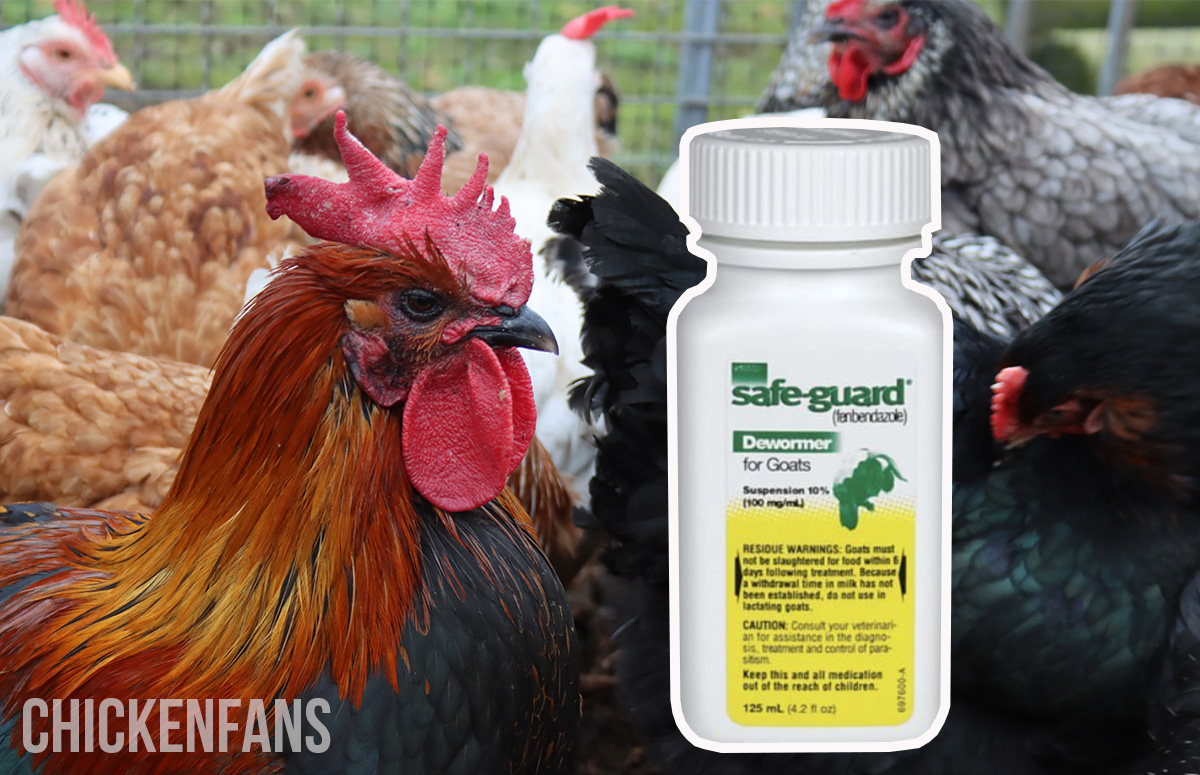

Chicken Fans is reader-supported. When you buy through our links, we may earn a commission. Learn more about our privacy policy and disclaimer.
Internal parasites and pesky worms can cause significant damage to a chicken’s internal bodily functions. They can make a whole flock incapable of feeding and drinking properly and raise the risk of being spread to other birds. Unfortunately, deworming chickens is just part of the deal when you’re raising a flock.
We took a deep dive with Dr. Cristina Vulpe (DVM) to turn her experience with farm animals into practical advice and information for chicken owners on how to deworm your chickens with Fenbendazole. We discuss what parasites it can be used for, its dosage, side effects, and more.
Using broad-spectrum dewormers is the best tool that chicken farmers and chicken lovers have at their disposal. Sometimes, they might not be approved by the FDA, but they are readily available, and if you follow the instructions correctly, there is no threat to your chickens’ health whatsoever.
What is Fenbendazole?
Fenbendazole is an anthelmintic medication that can be purchased over the counter and utilized in multiple species, not just chickens. It kills a variety of internal parasites, such as:
- Roundworms
- Tapeworms
- Hairworms
- Giardia
- Flukes
Fenbendazole is one of the few medications approved in the United States and other countries that can be purchased without a prescription. You can even get it in your local Tractor Supply.
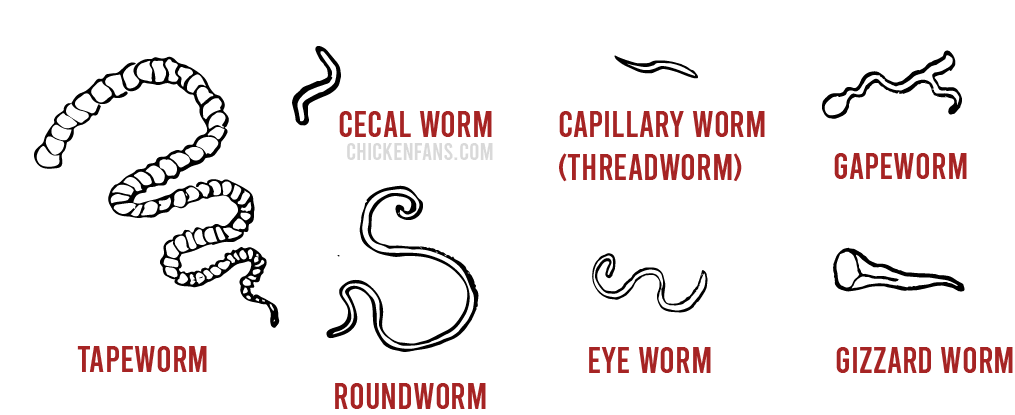
However, in the past few years, there have been higher and higher numbers of anthelmintic drugs taken off the list of approved products for treating worms in chickens. The main reason for this is the increased resistance of the parasites to these medications, along with bird owners’ reluctance to take them to the vet instead of treating them with OTC (over-the-counter) drugs.
- For roundworms and cecal worms, apply 0.1 – 0.23 ml per pound of body weight orally with a syringe once, repeat after 10 days
- For cappilaria, apply 0.1 – 0.23 ml per pound of body weight every day for 5 consecutive days
- For gapeworm, apply 0.136 ml per pound of body weight for 5 days
- For flukes, apply 0.1 – 0.23 ml per pound of body weight for 3 days
- Avoid during molt: can cause feather damage at regrowth
How Does Fenbendazole for Chickens Work?
You can use fenbendazole to kill worms in chickens. It is particularly effective against multiple types of parasites, but it works great, especially against roundworms. Respiratory worms such as Syngamus trachea are also sensitive to fenbendazole.
While the way antiparasitic drugs work can be a little complicated and diverse depending on the exact medication, fenbendazole kills worms by paralyzing their nervous system. They are then naturally eliminated by the chicken’s system to the outside environment, where they can no longer present a threat to other birds in the flock.
Vets highly recommend cleaning the spaces where your chickens spend their time. For the outdoors, you can utilize harsher insecticides to ensure that the eggs or larvae eliminated by the chickens are killed thoroughly. These pesticides work similarly to fenbendazole and other dewormers, although they have never been approved for internal use.
Dosage of Fenbendazole for Chickens
The most common dosage for chickens is 20 to 50 milligrams per kg for three to five days, but it mainly depends on the type of worm you’re trying to eliminate. Also, depending on the product, Panacur or Safe-Guard, you might have to do some math to determine the appropriate dose for your chickens.
| Type of Worm | Product | Concentration | mg / kg | ml/pound | Dosing Schedule |
|---|---|---|---|---|---|
| Roundworms | Safe-guard Dewormer for Goats | 10% -100 mg/ml | 10 – 50 m/kg | 0.05 – 0.23 ml/pound | orally once, repeat after 10 days |
| Cecal worm | Safe-guard Dewormer for Goats | 10% – 100 mg/ml | 10 – 50 m/kg | 0.05 – 0.23 ml/pound | orally once, repeat after 10 days |
| Cappilaria | Safe-guard Dewormer for Goats | 10% – 100 mg/ml | 10 – 50 m/kg | 0.05 – 0.23 ml/pound | every day for 5 consecutive days |
| Gapeworm | Safe-guard Dewormer for Goats | 10% – 100 mg/ml | 30 mg/kg | 0.136 ml/pound | every day for 5 consecutive days |
| Flukes | Safe-guard Dewormer for Goats | 10% – 100 mg/ml | 20-50 mg/kg | 0.1 – 0.23 ml/pound | every day for 3 consecutive days |
The easiest way to give this medication to your chickens is by adding it to their drinking water. However, this method also means you can’t control exactly how much of the drug each chicken gets.
The best way is to give Fenbendazole orally by weight and dose each chicken individually using a syringe – even if you have many chickens. A vet can do a fecal float test to determine which kind of worms your chicken is dealing with.
- For roundworms and cecal worms, apply 0.1 – 0.23 ml per pound of body weight orally with a syringe once, repeat after 10 days
- For cappilaria, apply 0.1 – 0.23 ml per pound of body weight every day for 5 consecutive days
- For gapeworm, apply 0.136 ml per pound of body weight for 5 days
- For flukes, apply 0.1 – 0.23 ml per pound of body weight for 3 days
- Avoid during molt: can cause feather damage at regrowth
Adjust the dose based on what you see in the droppings. For heavy infestations, give 23 ml per pound of body weight.
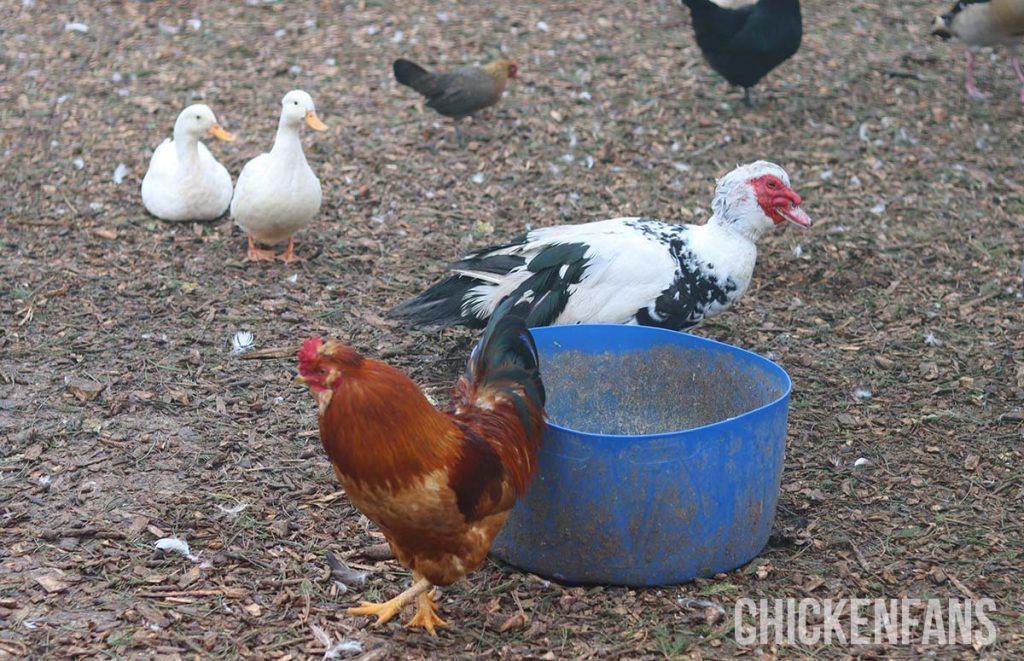
Fenbendazole can also be utilized in turkeys and ducks, but the dosage depends not only on the species you are trying to deworm but also on the types of parasites you’re trying to kill. The 20-50mg dosage previously mentioned is a general guideline:
- It kills Ascaridia galli and Heterakis gallinarum in chickens and turkeys at 1 mg/kg for five consecutive days;
- It can be used for all Ascaris species in a single dose of 10-50 mg/kg, with a potential repeat dose at ten days;
- Its usage during molt periods is not recommended.
Even though no egg withdrawal periods are currently recommended, avoiding consuming the chickens’ eggs while undergoing this treatment would be a good idea.
To give you peace of mind, fenbendazole is also approved for use in humans, so even if you eat the eggs, you will not be ingesting medication that is not approved for humans. Nevertheless, being exposed to dewormers consistently could decrease your resistance if you also have to receive treatment for internal parasites.
Side Effects of Fenbendazole in Chickens?
You’ll be happy to know that this medication does not pose any specific health threats if administered to chickens at regular doses. Talk to your (poultry) veterinarian if you have any second thoughts about using a specific dose.
The most common side effects encountered in chickens are:
- Diarrhea
- Constipation
- Decreased appetite
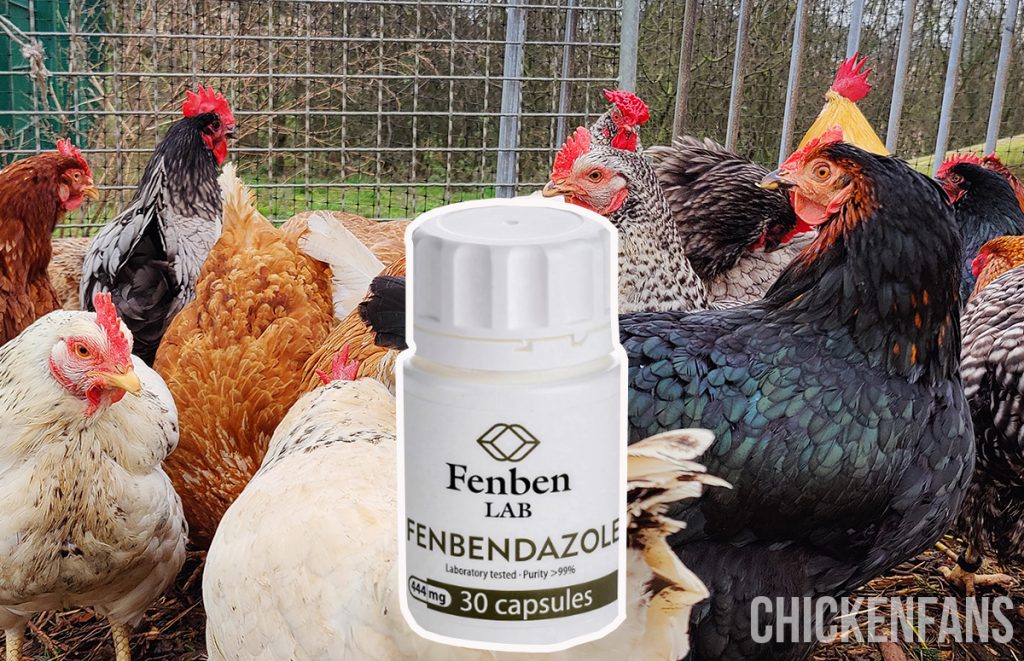
As this medication kills the parasites, if the chickens have a severe number of worms in their intestinal tract, they can suffer some allergic reactions. Normally, fenbendazole is well-tolerated in all species, including pets like dogs, but calculating the appropriate dosage is of utmost importance if you want to prevent your chickens from experiencing any adverse reactions.
Usage of fenbendazole in pigeons is not recommended. Several health studies have shown that it is associated with mortality in this bird species. One scientific paper, in particular, noted that eight out of 12 pigeons treated with fenbendazole for five days at a dosage of 30mg per kg orally developed symptoms like:
- Dehydration
- Lethargy
- Anorexia
- Sudden death within two days of the first symptoms
Fenbendazole Alternatives for Treating Worms
Fenbendazole is not the only dewormer currently used for treating internal parasites in chickens. There are multiple other drugs, some of which can be bought over the counter, whereas, for others, you will need a prescription from your veterinarian. The most common fenbendazole alternatives are described below.
Levamisole
As one of the most commonly used chicken dewormers, levamisole is in the same pharmaceutical class as fenbendazole. Consequently, it kills most of the parasite species we have previously mentioned.
The dosage is 25 to 30 mg/kg for two consecutive days, and for preventative purposes, it can be given one day per month in drinking water. Its use in kiwis is prohibited as this bird species is extremely sensitive to levamisole. Do not give it to pets (usage in cats can prove fatal) or any other species for which it is not approved.
Flubendazole
Although not as frequently used in North America, flubendazole is approved in Europe against worms like Ascaridia and H. gallinarum species. You should use 1.43 mg/kg for seven consecutive days.
Luckily, flubendazole can also be used in other bird species besides chickens, such as geese and turkeys. The dosage varies depending on the size of each individual, but the most common way to administer it is in the feed. Drenches, tablets, and pills can also be available in Europe. You will need a prescription from your veterinarian for this medication.
Ivermectin
Ivermectin is a broad-spectrum antiparasitic medication that works wonders when treating internal and external parasites. For example, it can kill roundworms, cecal worms, gapeworms, and even Capillaria species, for which fenbendazole is not recommended. Ivermectin can also be used to kill most mites and lice in chickens.
Chickens and ducks should receive 0.2 to 0.4mg per kg by applying the drops immediately on the chickens’ skin, with a repeat dose at 7 to 10 days. Some side effects, such as diarrhea and abdominal swelling, can be seen.
Cambendazole
This medication is mainly used against nematodes and cestodes, as it manages to kill both species. In chickens, the recommended dosage is 50 mg/kg body weight for three consecutive days. At a dosage of 60 mg for the same period, it kills A. anseris and T. tenuis.
The downside is that the medication is quite rare, and from what we’ve gathered, it is not over the counter, nor can it be purchased online anywhere in North America. You’ll have to ask your poultry veterinarian for more information if you want to try it out — especially since the parasites have less resistance to it than widely used drugs such as fenbendazole.
Albendazole
Albendazole is another fenbendazole alternative you might want to consider for deworming your chickens, especially since it is given in a single dose of 5 mg/kg bird weight. It is effective against most nematodes of fowl, but it also kills cestodes at higher doses of 20 mg/kg body weight.
While you might be lucky enough to find it off-label under commercial names such as Valbazen or actual albendazole, an important note must be made. The FDA has not approved it for use in chickens, but it is commonly used in species such as cattle and sheep. While not many studies note a withdrawal period, it’s recommended that you wait for at least a week before consuming the eggs. It is not to be used in doves and pigeons.
Phenothiazine
This drug used to be approved in the United States, but its use in poultry is no longer accepted in this country. It is a toxic medication, like any other dewormers we have mentioned, but when used cautiously and in the right doses, it is successful and safe.
People who have access to it (outside of the U.S., of course) can combine it with piperazine to treat cecal worms, Heterakis, and ascarids. The dosage is 0.5g per bird in your chickens’ drinking water. It can also be administered to turkeys in the dosage of 1g per bird for one day.
Diatomaceous Earth
Many homesteaders deworm their pets and farm animals with diatomaceous earth. However, the FDA or other national health associations have never approved its usage for internal parasites. Some sources suggest that adding it as a supplement in the ratio of 2% in the chickens’ feed can at least decrease the number of Capillaria and Heterakis parasites that the birds have.
It is quite a risky product, mainly because small particles of it can stick to the birds’ respiratory tracts and cause severe breathing problems.
Apple Cider Vinegar
Some chicken owners claim that apple cider vinegar is a wonder dewormer for chickens, but this isn’t entirely true. Apple cider vinegar might help chickens pass stools regularly, which could assist in getting rid of some intestinal parasites.
But it doesn’t kill these parasites or affect how long they survive. It also doesn’t work as a dewormer, even though it does support good gut bacteria in chickens.
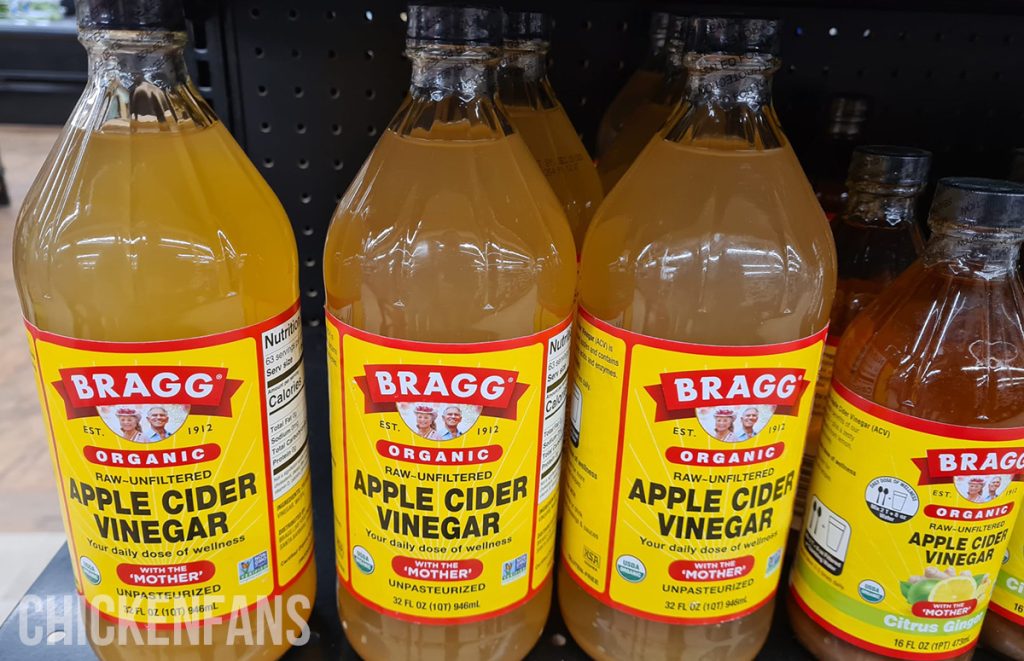
Protecting Chickens Against Internal Parasites
Keeping your birds as healthy as possible is the best tool you have at your disposal if you’re focused on preventing parasite infestations. Here are a few tips for doing so:
- Avoid overcrowding chickens in their living space to limit the spread of worms if they appear
- Try to keep feeders and waterers as clean as possible
- Change your chickens’ bedding periodically
- Make sure your birds are not stressed, as stress is associated with multiple health conditions
- Avoid keeping food or water inside the coop, as this promotes the spread of parasites
Frequently Asked Questions
20 to 50 mg per kg body weight (or 20 to 50 mg per 2.2 pounds) is the recommended dosage for chickens. Some people also give it preventatively for worms at 10 mg per kg body weight.
While there is no official egg waiting period for fenbendazole usage in chickens, it’s best to not eat their eggs during the treatment.
Every dewormer is liver-toxic when it is not used appropriately. That means that if you give your chickens a higher dose or you choose to give them fenbendazole for multiple days, you can expect some of them to develop signs of liver toxicity or general malaise.
While these two medications are from different pharmaceutical classes, they are both effective dewormers. Ivermectin has some residual activity, which means it can protect birds longer, especially with larvae present.
- For roundworms and cecal worms, apply 0.1 – 0.23 ml per pound of body weight orally with a syringe once, repeat after 10 days
- For cappilaria, apply 0.1 – 0.23 ml per pound of body weight every day for 5 consecutive days
- For gapeworm, apply 0.136 ml per pound of body weight for 5 days
- For flukes, apply 0.1 – 0.23 ml per pound of body weight for 3 days
- Avoid during molt: can cause feather damage at regrowth
Summary
Fenbendazole is an effective dewormer for chickens. It kills a wide variety of internal parasites, from roundworms to some types of tapeworms. This drug is less effective against Capillaria species and should never be used in pigeons, as they are sensitive to fenbendazole.
The dosage in chickens is 20 to 50 milligrams per kg for 3 to 5 days. The most common commercial variants of this dewormer are Panacur and Safe-Guard, both of which are available in North America and other countries across the globe. If you do not want to treat your chickens with fenbendazole, some alternatives are flubendazole, ivermectin, albendazole, and levamisole.
If you enjoyed reading this article, you might want to check out our article on Worms in Chickens, Ivermectin for Chickens, Symptom Checker, Health Page, or Chicken Behavior page.
Resources
1. Mortality Associated with Fenbendazole Administration in Pigeons (Columba livia), Alfonso S. Gozalo et al, 2006, Journal of the American Association for Laboratory Animal Science: https://www.ingentaconnect.com/content/aalas/jaalas/2006/00000045/00000006/art00012?crawler=true
2. Comparative efficacy of ivermectin and fenbendazole against ancylostomiasis in dogs, Rojali Bhanjadeo et al, 2023: https://link.springer.com/article/10.1007/s12639-022-01536-9
3. Helminthiasis in Poultry (Nematode and cestode infections), Kenneth S. Macklin, Rudiger Hauck, 2019: https://www.merckvetmanual.com/poultry/helminthiasis/helminthiasis-in-poultry
4. Safe-Guard AquaSol (fenbedazole oral suspension), Merck Animal Health: https://www.merck-animal-health-usa.com/species/poultry/products/safe-guard-aquasol
5. Anthelmintic efficacy of fenbendazole and levamisole in native fowl in northern Iran, Atefe Saemi Soudkolaei et al, 2021: https://pubmed.ncbi.nlm.nih.gov/33557928/
6. Fenbendazole resistance in Heterakis gallinarum, the vector of Histomonas meleagridis, on a broiler breeder farm in South Carolina, James B. Collins et al, 2022: https://pubmed.ncbi.nlm.nih.gov/36436885/
7. Risk Assessment of Human Consumption of Meat from Fenbendazole-Treated Pheasants, Marta Carreno Gutiez et al, 2021: https://www.ncbi.nlm.nih.gov/pmc/articles/PMC8212976/
8. Ritchie, B. W., Harrison, G. J., & Harrison, L. R. (Eds.). Avian Medicine: Principles and Applications. Wingers Publishing.
9. Speer, B. L. (Ed.). Current Therapy in Avian Medicine and Surgery. Elsevier Health Sciences.
